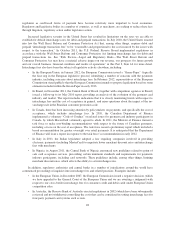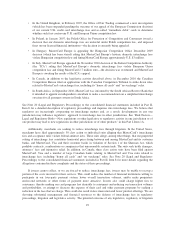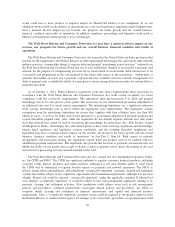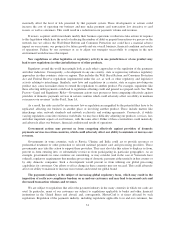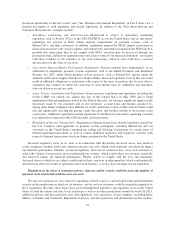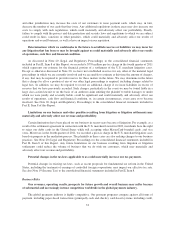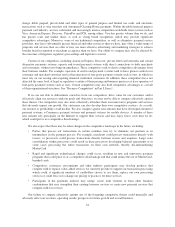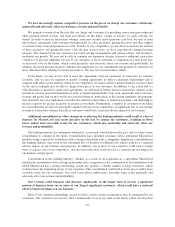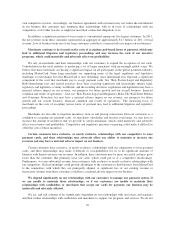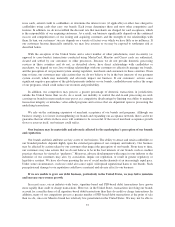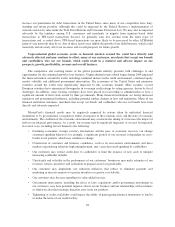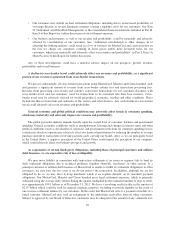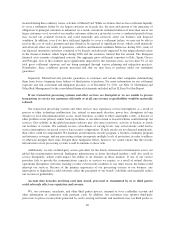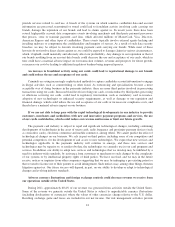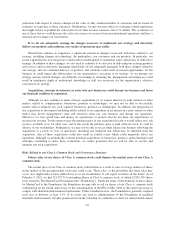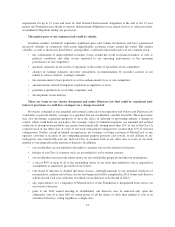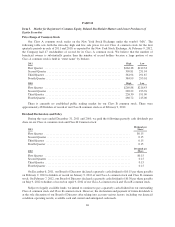MasterCard 2011 Annual Report Download - page 42
Download and view the complete annual report
Please find page 42 of the 2011 MasterCard annual report below. You can navigate through the pages in the report by either clicking on the pages listed below, or by using the keyword search tool below to find specific information within the annual report.increase our penetration for debit transactions in the United States since many of our competitors have long-
standing and strong positions (although this could be impacted by the Federal Reserve’s implementation of
network exclusivity rules under the Wall Street Reform and Consumer Protection Act). We may also be impacted
adversely by the tendency among U.S. consumers and merchants to migrate from signature-based debit
transactions to PIN-based transactions because we generally earn less revenue from the latter types of
transactions and, as noted above, PIN-based transactions are more likely to be processed by other ATM/debit
point-of-sale networks than by us. Any of these factors may inhibit the growth of our debit business, which could
materially and adversely affect our revenues and overall prospects for future growth.
Unprecedented global economic events in financial markets around the world have directly and
adversely affected, and may continue to affect, many of our customers, merchants that accept our brands
and cardholders who use our brands, which could result in a material and adverse impact on our
prospects, growth, profitability, revenue and overall business.
The competitive and evolving nature of the global payments industry provides both challenges to and
opportunities for the continued growth of our business. Unprecedented events which began during 2008 impacted
the financial markets around the world, including continued distress in the credit environment, continued equity
market volatility and additional government intervention. The economies of the United States and numerous
countries around the world were significantly impacted by this economic turmoil. More recently, several
European countries have experienced downgrades in sovereign credit ratings by rating agencies, driven by fiscal
challenges. In addition, some existing customers have been placed in receivership or administration or have a
significant amount of their stock owned by their governments. Many financial institutions are facing increased
regulatory and governmental influence, including potential further changes in laws and regulations. Many of our
financial institution customers, merchants that accept our brands and cardholders who use our brands have been
directly and adversely impacted.
MasterCard’s financial results may be negatively impacted by actions taken by individual financial
institutions or by governmental or regulatory bodies in response to the economic crisis and the state of economic
environments. The condition of the economic environment may accelerate the timing of or increase the impact of
risks to our financial performance. As a result, our revenue may be negatively impacted, or we may be impacted,
in several ways, including but not limited to the following:
• Declining economies, foreign currency fluctuations and the pace of economic recovery can change
consumer spending behaviors; for example, a significant portion of our revenues is dependent on cross-
border travel patterns, which may continue to change.
• Constriction of consumer and business confidence, such as in recessionary environments and those
markets experiencing relatively high unemployment, may cause decreased spending by cardholders.
• Our customers may restrict credit lines to cardholders or limit the issuance of new cards to mitigate
increasing cardholder defaults.
• Uncertainty and volatility in the performance of our customers’ businesses may make estimates of our
revenues, rebates, incentives and realization of prepaid assets less predictable.
• Our customers may implement cost reduction initiatives that reduce or eliminate payment card
marketing or increase requests for greater incentives or greater cost stability.
• Our customers may decrease spending for value-added services.
• Government intervention, including the effect of laws, regulations and/or government investments in
our customers, may have potential negative effects on our business and our relationships with customers
or otherwise alter their strategic direction away from our products.
• Tightening of credit availability could impact the ability of participating financial institutions to lend to
us under the terms of our credit facility.
38


